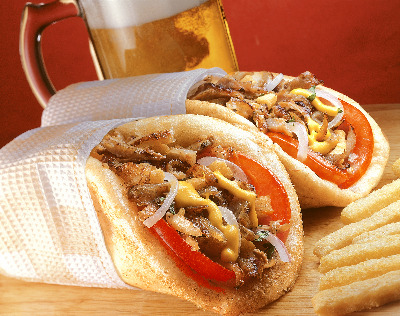Greece: souvlaki, kebab and McDonalds? no way!
 •
by
•
by THRAX and RUMELIAN
Greece is the only country in the world where MacDonalds loses money... why?
Cause we know fast food better than everyone! We had MacDonalds and fast food thousands of years before MacDonalds!!!
The ancient Mycenaeans have a reputation as palace-builders and warriors, but they were also quite sophisticated cooks. More than 3,000 years ago, they used portable grill pits to make souvlaki and non-stick pans to make bread, new cooking experiments suggest.

The souvlaki trays were rectangular ceramic pans that sat underneath skewers of meat. Scientists weren't sure whether these trays would have been placed directly over a fire, catching fat drippings from the meat, or if the pans would have held hot coals like a portable barbeque pit.
The Mycenaeans left behind amazing palaces and gold-littered tombs at sites like Pylos and Mycenae, but in these places, archaeologists also have found less glamorous artifacts, such as souvlaki trays and griddles made from gritty clays.
http://www.livescience.com/42414-ancient-cooking-mycenaeans-portable-grills.html
The word souvlaki is a diminutive of the Greek souvla (spit), itself borrowed from the Latin word subula. But the origins of souvlaki date back to ancient Greece. It was known with the name obeliskos (dim. of obelos –spit), mentioned by among others in the works of Aristophanes, Xenophon, Aristotle etc. A meat and bread recipe which resembles the way pita souvlaki is served today with pita bread was also attested by Athenaeus in his “Deipnosophistae” and called the plate kandaulos.

Kebab is a traditional dish of sliced meat originating in the Middle East and later adopted in Central Asia and by the regions of the former Ottoman Empire, before spreading worldwide. The word kebab is derived from the Arabic word "kabab" meaning "fry". The word was first mentioned in a Turkish script of Kyssa-i Yusuf in 1377, which is the oldest known source where kebab is mentioned as a food.
However, an early variant of kebab (Ancient Greek: ὀβελίσκος - obeliskos) is attested in Greece since 8th century BCE (archaic period) in Homer's Iliad and Odyssey and in classical Greece, amongst others in the works of Aristophanes, Xenophon and Aristotle.
The skewered kebab-like recipe existed as a favourite in ancient Greece during Archaic times, as the earliest references are attested in Homer. However, excavations held in Akrotiri on the Greek island of Santorini unearthed stone sets of barbecues for skewers (Greek: krateutai) used before the 17th century BC.
thats why...

MacDonalds go home re!!!!


Comments
1st?
! πρώτη φορά πρώτος? δεν αγόρασες ψήφους εσύ?
Ψήφος!
2nd
3rd
Κάποιος με πρόλαβε για 1''
i am now hungry send me some q7 food
lol
my frinend theese days q7 is not fast food... it is a expensive restaurant food!
v
ψου!
σούβλακος!
V
Everything is better than Mcdonalds. That kebab looks so tasty🙂
V
votado
mcdonalds loosing money all over the world, burger king ziker aq
REMOVE KEBAB
why? hungry? 😁
voted
ψήφος και πείνα
😉
pao na xtypiso dyopitogyra !
v
Σουβλάκι, τροφή Ελληνική !!!
σουβλάκι,όχι τυλιχτό που το λένε οι βλάχοι
έφαγα γύρο χοιρινό και κοκορέτσι , κλάσης ανώτερα από απλά σουβλάκια
v
Hail kebab
Hail Turkey
πες τα ρε που τρώγανε ότι έπεφτε από τα δέντρα και ότι σκοτώνανε οι κεραυνοι